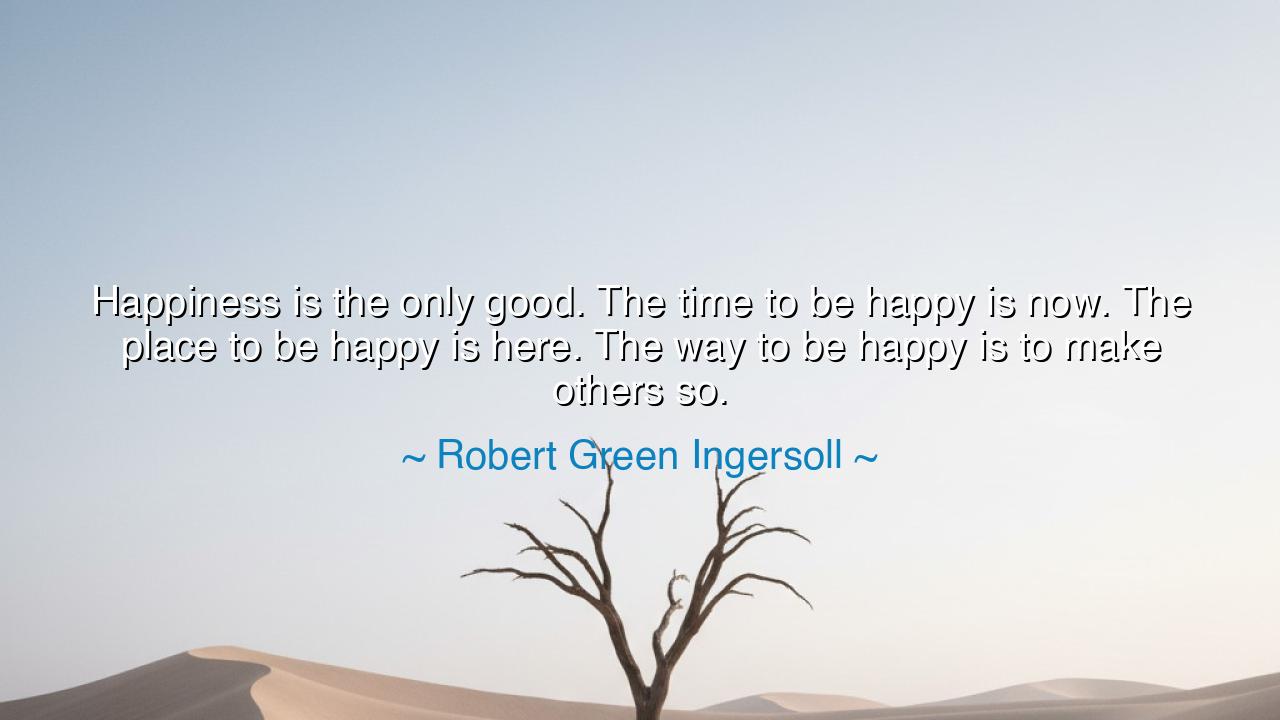
Happiness is the only good. The time to be happy is now. The
Happiness is the only good. The time to be happy is now. The place to be happy is here. The way to be happy is to make others so.






"Happiness is the only good. The time to be happy is now. The place to be happy is here. The way to be happy is to make others so." Thus spoke Robert Green Ingersoll, a man known in his age as “The Great Agnostic,” whose words rang with the moral courage of one who sought truth not in heaven alone, but in the human heart. In these lines, he offers a philosophy at once simple and sublime—a vision of life rooted not in fear or restraint, but in joy, compassion, and presence. For Ingersoll, happiness was not a luxury, nor a reward waiting beyond the grave—it was the sacred purpose of living itself.
When he said that happiness is the only good, he declared a truth both radical and eternal. Many have chased virtue, power, or salvation as life’s ultimate aim, yet Ingersoll reminds us that all these, without joy, are hollow. True goodness, he said, is not measured by suffering endured, but by happiness shared. For when a man lives joyfully, with kindness and integrity, he uplifts others as naturally as the sun gives light. To pursue happiness rightly—not selfish pleasure, but the joy that springs from love, truth, and service—is to live in harmony with life’s deepest order.
The next words of his teaching—“The time to be happy is now, the place to be happy is here”—reveal the wisdom of presence, a wisdom known to prophets and poets alike. How often men defer their joy, saying, “Tomorrow I will rest, someday I will live,” until life has slipped through their fingers like sand. Ingersoll calls us to awaken—to claim the miracle of this moment, to find peace not in some distant time or place, but in the heart that is willing to see beauty where it stands. For joy delayed is joy denied, and to wait for perfect circumstances is to wait forever. The now is the altar of life, and the here is the only ground upon which happiness can take root.
Yet, perhaps the greatest jewel in this crown of wisdom is his final truth: “The way to be happy is to make others so.” In these words, Ingersoll reveals the secret long known by sages—the paradox of joy, that it grows only when it is given. He knew that the deepest happiness is not found in possession or indulgence, but in service—in the gentle art of making others smile, of easing another’s burden, of lighting one candle in the darkness. This is no sentimental ideal, but a living law: that the heart expands through generosity, that in lifting others we rise ourselves.
The world has seen this truth embodied in countless lives. Consider Mother Teresa, who walked among the destitute of Calcutta, tending to their wounds, whispering comfort to those forgotten by the world. She possessed little, yet her joy was immeasurable. Her happiness did not depend on what she received, but on what she gave. In her humble acts, she embodied Ingersoll’s teaching: that to make others happy is to touch eternity through compassion. The same spirit lived in Robert Ingersoll himself, who though criticized for his rejection of dogma, never ceased to preach love, tolerance, and the sacred duty of kindness.
The origin of Ingersoll’s words lies in his belief in human dignity and the power of the present life. He lived in a time when faith and fear bound men to ideas of punishment and reward beyond the grave, but he sought to free them—to remind them that the divine could be found in laughter, in friendship, in the simple joy of existence. For him, the highest morality was not in obedience, but in kindness; not in renunciation, but in celebration. His philosophy was not one of denial, but of reverence for the beauty of being alive.
So, my children of tomorrow, take this teaching into your hearts. Seek not happiness in distant dreams, nor in the approval of others, but in the sacredness of now. Be present. Be kind. Be grateful for the ground beneath your feet and the sky above your head. Let your joy not be hoarded, but shared—through words of encouragement, acts of mercy, and quiet understanding. For in the giving of happiness, you will find your own multiplied.
And remember always the wisdom of Robert Green Ingersoll: that happiness is the only good, that its time is now, its place is here, and its path is through love for others. Live this truth, and your days will be full, your heart light, and your spirit unbroken—for in making the world brighter for another soul, you will have found heaven not above, but within.






AAdministratorAdministrator
Welcome, honored guests. Please leave a comment, we will respond soon